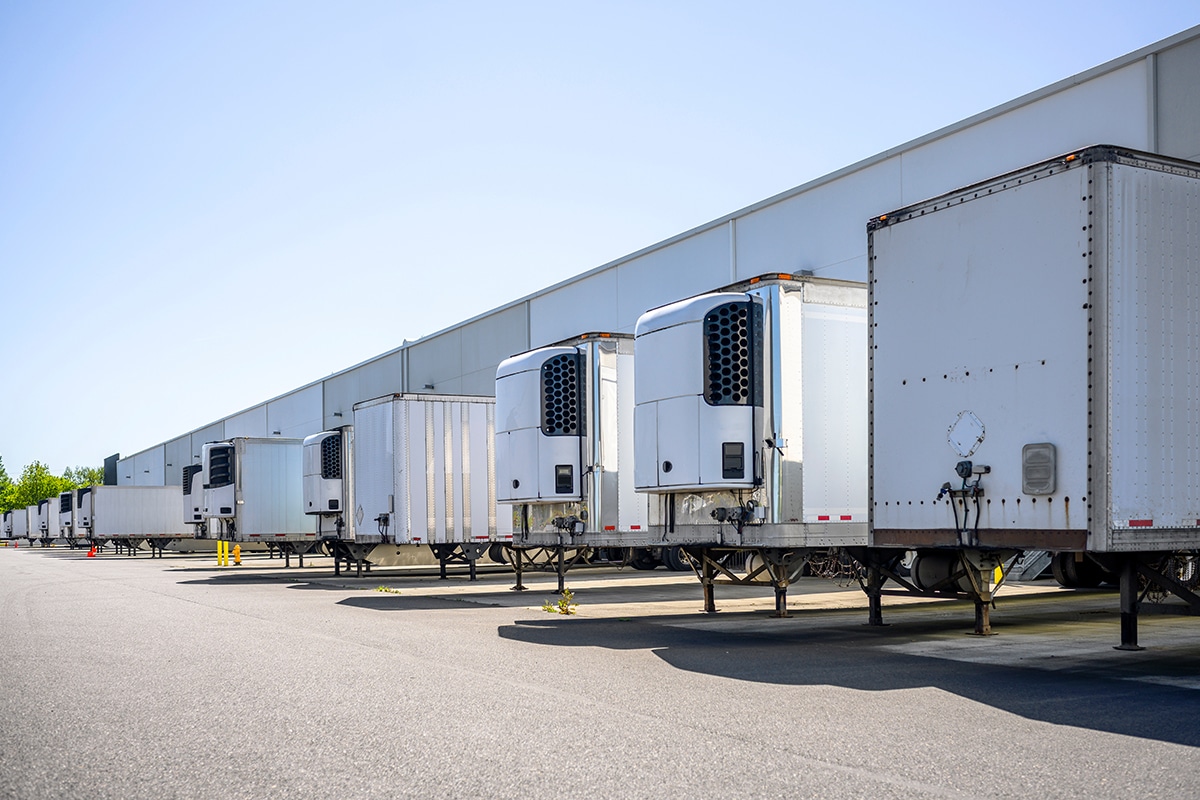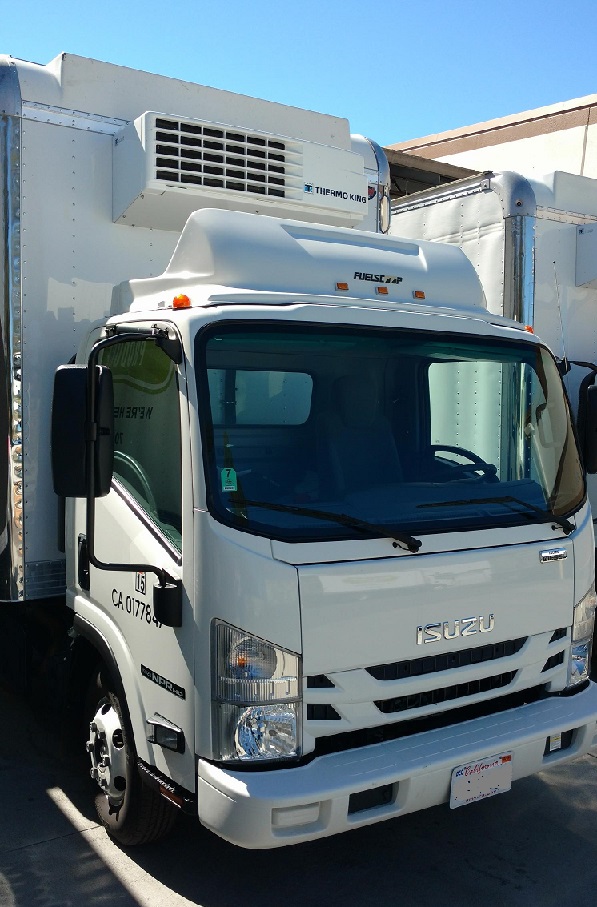Thermo King Transport Refrigeration: Reputable Solutions for Cold Chain
Thermo King Transport Refrigeration: Reputable Solutions for Cold Chain
Blog Article
Top Advancements in Transport Refrigeration: Enhancing Effectiveness and Security
The landscape of transport refrigeration is undertaking considerable improvement, driven by advancements intended at enhancing both performance and safety. Key developments such as smart temperature level tracking systems, green refrigerants, and automated path optimization are crucial in addressing the market's challenges. These modern technologies not just guarantee the honesty of temperature-sensitive goods but additionally add to sustainability initiatives. As these technologies proceed to advance, it is necessary to explore their ramifications on functional practices and governing conformity, motivating a better examination of how they improve the future of transportation refrigeration.
Smart Temperature Level Keeping Track Of Systems
In the world of transportation refrigeration, smart temperature level surveillance systems have become a critical technology for ensuring the honesty of temperature-sensitive items. These innovative systems utilize Internet of Points (IoT) technology to give real-time data on temperature fluctuations, enabling drivers to preserve optimum conditions throughout the supply chain. By constantly tracking the temperature level of refrigerated containers and automobiles, business can promptly recognize variances that might compromise item quality.

Moreover, smart surveillance systems frequently include automated notifies and notifications, enabling stakeholders to react without delay to any prospective problems. This proactive method not only minimizes the danger of wasting but also improves compliance with regulatory criteria controling food safety and security and pharmaceutical transportation.
The integration of information analytics within these systems also helps with anticipating maintenance, assisting drivers to visualize possible devices failures before they take place. This capacity reduces downtime and optimizes functional performance, ultimately causing set you back savings.
Eco-Friendly Refrigerants
Smart temperature tracking systems play a crucial duty in keeping product high quality, however the effectiveness of transport refrigeration additionally pivots on the option of cooling agents used. In comparison, emerging choices like hydrocarbon-based cooling agents and hydrofluoroolefins (HFOs) existing lower GWP options, using both performance and sustainability.
These green cooling agents not only decrease environmental influence yet additionally align with international laws targeted at terminating damaging materials. Their fostering can result in boosted power effectiveness, inevitably decreasing operating costs for transportation refrigeration systems. Furthermore, the usage of natural refrigerants, such as ammonia and carbon dioxide, has obtained traction as a result of their superb thermodynamic residential or commercial properties and reduced environmental footprint.
Investing in eco-friendly cooling agents is not simply a regulatory conformity step; it represents a strategic choice that improves brand name credibility and cultivates consumer commitment. thermo king transport refrigeration. By prioritizing sustainable methods, business can contribute to a greener future while making sure the honesty of transferred goods
Advanced Insulation Materials
Utilizing advanced insulation products is essential for maximizing transport refrigeration systems, as they considerably boost energy performance and preserve regular temperature control. Typical insulation techniques commonly drop short in avoiding thermal transfer, causing increased power consumption and varying temperature levels within chilled areas.
Emerging materials such as vacuum insulated panels (VIPs) and aerogels offer superior thermal resistance, enabling thinner profiles without endangering performance. VIPs, for circumstances, make use of a vacuum layer to decrease convective and conductive warm transfer, making them optimal for space-constrained applications. Aerogels, understood for their lightweight and porous framework, offer outstanding insulation while significantly minimizing total system weight.
Additionally, integrating phase change products (PCMs) into insulation systems can further stabilize temperature levels throughout transportation. These materials take in and launch thermal energy, effectively buffering against external temperature level variations.
The combination of these advanced insulation materials not only lowers the functional costs linked with power consumption yet also prolongs the service life of temperature-sensitive items. As the transportation refrigeration market remains to develop, the adoption of ingenious insulation modern technologies will certainly be critical in improving both performance and safety and security in chilled transport.
Automated Course Optimization
The effectiveness of transport refrigeration systems is greatly enhanced via automated course optimization, which leverages innovative algorithms and real-time data to figure out the most reliable courses for shipment. By analyzing different elements such as web traffic patterns, weather conditions, and delivery windows, these systems can considerably reduce travel time and fuel intake.
Automated path optimization lessens human error and subjective decision-making, which can lead to ineffectiveness. This modern technology makes it possible for fleet managers to allocate sources better, making certain that refrigerated products keep their required temperature level throughout the journey. By maximizing paths, firms can likewise improve consumer satisfaction with timely distributions.
In addition, automated systems can adjust to unexpected circumstances, such as road closures or unexpected website traffic spikes, enabling dynamic rerouting. This adaptability not only safeguards the stability of temperature-sensitive items but likewise contributes to total functional effectiveness.
Executing automated path optimization can lead to substantial price savings while decreasing the carbon impact connected with transportation. As businesses significantly focus on sustainability, this development sticks out as a vital part in contemporary transport refrigeration, aligning functional goals with environmental duty. Inevitably, automated route optimization stands for a considerable improvement in the quest for efficiency and safety in transportation refrigeration.

Real-Time Data Analytics
Automated route optimization significantly benefits from the assimilation of real-time data analytics, which offers crucial understandings right into the efficiency of transportation refrigeration systems. By utilizing real-time information, transport operators can monitor temperature level fluctuations and tools efficiency, guaranteeing that perishable goods are kept within needed criteria throughout transit. This aggressive technique not only enhances the high quality of the transferred items yet likewise reduces the threat of wasting and loss.

In enhancement to improving efficiency, real-time analytics improves safety by making click to investigate certain conformity with regulatory requirements for temperature level control. This not just safeguards public wellness yet also fortifies a business's reputation - refrigerated transportation thermo king. As the transport refrigeration market evolves, the combination of real-time information analytics emerges as a cornerstone for driving innovation, sustainability, and operational quality
Final Thought
To conclude, the advancements in transportation refrigeration significantly improve both performance and safety within the sector. Smart temperature monitoring systems and real-time information analytics offer important oversight, while environment-friendly cooling agents and advanced insulation materials add to sustainability and power efficiency. Automated course optimization algorithms not only decrease traveling time but also minimize environmental impact. Jointly, these developments stand for a crucial development in transportation refrigeration, making sure compliance with governing standards and advertising a greener future.
The landscape of transport refrigeration is going through considerable change, driven by innovations intended at improving both effectiveness and safety.Smart temperature monitoring systems play an important duty in maintaining item high quality, but the performance of transportation refrigeration also pivots on the option of refrigerants made use of. Their adoption can lead to boosted energy efficiency, eventually lowering operating expenses for transport refrigeration systems. Eventually, automated path optimization stands for a significant development in the mission for effectiveness and safety in transport refrigeration.
In final thought, the advancements in transport pop over to this site refrigeration considerably boost both effectiveness and safety and security within the sector.
Report this page